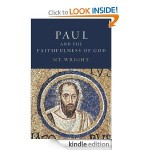One of the things about being a global thinker is that you realize the merits of a spectrum of viewpoints, and even realize that it is not often wise to pick sides in the history vs. theology debate, not least because the Gospel involves both. Christianity is after all an historical religion, and as I am prone to stress nothing can be theologically true that is historically false, if we are talking about the places where theology and history intersect. Fortunately, Tom Wright is insistent that history and theology need to be held together to understand Paul and his thought world and his praxis and his symbols and his stories. In other words, we need to history and theology to understand just about anything of importance about Paul. Tom is not enamored with either those who would want to reduce theology to history, or alternately ignore history as irrelevant to doing theology. In a creative and interesting allegory towards the end of Chapter One, using Philemon and Onesimus as ciphers he says this “There are many Philemons out there, the self-appointed guardians of Pauline orthodoxy (of whichever sort) who will only be prepared to have the slave [in this case history] back in the house once he’s been suitably chastised and given strict conditions of service. Do not give us this History they say; do not tell us that in order to understand Paul we have to study his context, to learn about the Jewish world of the first century and the pre-Pauline meanings of Paul’s favorite words! How will Theology be able to speak the good news if it is festooned with footnotes about Pharisees and spattered with speculation about the sectarians? How can we sing the lord’s song in such a strange land? Is this not an appeal away from the Text, and is not our calling (as devout scripture believers– or simply as good, quasi-Barthian postliberals) to deal with the Text and nothing but the Text, and to keep away from everything else? Were not the years AD 1-30 a special time, different from all others, so that all we need to know is that in that time God walked the earth, died for our sins, and rose again? Or (another voice from a similar point of view) is it not the case that the great traditions of the church, with their creeds and canons have provided a wise and authoritative reading of all scriptures, so that we should pay attention to them rather than to historical reconstructions based on the wider world of the first century?”(p. 69).
And Wright pin points just why it is that so many conservatives become if not agnostic about history (it doesn’t matter or affect my faith), then gnostic (the Gospel is about spiritual truths and eternal verities not historical particulars) about history. “History is after all about danger; the danger of contingency, the possibility that things might have been otherwise, the prospect of being adrift a night and a day on a sea of unsorted data, the likelihood of being lashed, beaten, and stoned by other evidence, other world views, determined to provide a harsh reality check by which to measure Theology and cut it down to size.” (p. 70). In short, conservatives happily exchange the messiness of history for the apparent tidiness of an airtight theology which very rarely has any contact with history. Unfortunately for this approach, God himself has vetoed it by getting involved repeatedly in the messiness of history. It’s what the word incarnation connotes. Christianity and the Christian faith is not just about having a set of nicely connected theological ideas. It certainly involves ideas, mindsets, worldviews, but that is by no means all it involves. Tom Wright quite rightly wants a both/and approach when it comes to theology and history. We must all beware of lusting for a kind of certainty when it comes to the knowledge of God or his ways, that makes faith unnecessary and history at best a sub-floor, best unseen and unexamined, in the theological hotel.
One final thing about Chapter One… its full of interesting metaphors and zingers. Tom Wright is fun to read, even when he is in deadly earnest. For example, for the sake of focusing on the main thing he says he will focus on the seven letters widely regarded as authentically Pauline “and bring in Ephesians and 2 Thessalonians rather as Winston Churchill said he would bring ancient languages into a modern school curriculum; he would, he said, ‘let the clever ones learn Latin, as an honor, and Greek as a treat.’…1 Timothy and Titus… will be used, in the opposite way to that in which a drunkard uses a lamppost, for illumination rather than for support.” (p. 61).














